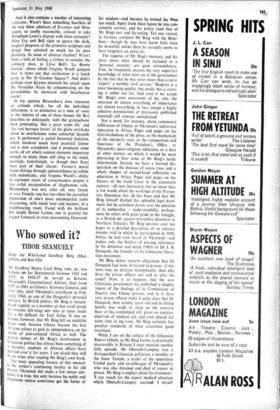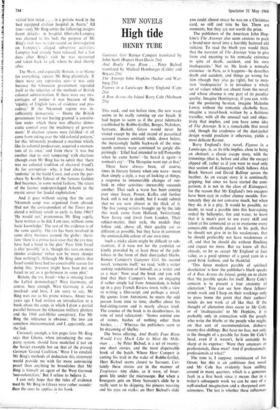Who sowed it?
TIBOR SZAMUELY
Reap the Whirlwind Geoffrey Bing (Mac- gibbon and Kee 63s)
Mr Geoffrey Henry Cecil Bing, CMG, QC, was Labour MP for Hornchurch between 1945 and 1955; in 1956-57 he served as Kwame Nkrumah's Constitutional Adviser, then from 1957 to 1961 as Ghana's Attorney General, and after that, until Nkrumah's overthrow in Feb- ruary 1966, as one of the Osagyefo's personal advisers. In British politics Mr Bing is remem- bered vaguely as a member of that small group of extreme left-wing MPS who at times made life a bit difficult for Earl Attlee. It was on Ghana, however, that Mr Bing left an indelible mark—and, because Ghana became the first African colony to gain its independence, on the whole of post-colonial Africa as well. The precise nature of Mr Bing's involvement in Ghanaian politics has always been something of a mystery; students of African affairs-have Puzzled over it for years. I am afraid they will be no wiser after reading Mr Bing's own book.
The most appealing feature of this memoir is the author's continuing loyalty to his old master. Nkrumah did make a few minor mis- takes, it is true, but only because his noble and impetuous nature sometimes got the better of his wisdom—and because he trusted the West too much. Apart from these lapses he was con- sistently correct, and his policy (and that of Mr Bing) just and far-seeing. Yet one cannot, in fairness, compare Mr Bing with the Bour- bons: though he may have learnt little since his downfall, unlike them he certainly seems to have forgotten an awful lot.
The vagaries of Mr Bing's memory, and his ideas about what should be included in a 'personal account,' are quite extraordinary. True, he frequently excuses his very imperfect knowledge of what went on in the government by the fact that he was never more than a mere `expert,' a humble 'civil servant.' Modesty is a most becoming quality, but surely this is carry- ing it rather too far. And even if we accept Mr Bing's own assessment of his role, the omission of almost everything of importance (of almost everything, in fact, except a highly selective presentation of previously published material) still remains unexplained.
Not a word, for instance, about communist infiltration of Ghana, or Nkrumah's subversive education in Africa. Pages and pages on the Gleichschaltung of the press, or the mechanism of the one-party state, or the composition and functions of the President's Office, or Nkrumah's quasi-religious adulation, or a host of other matters on which it would be most interesting to hear some of Mr Bing's inside information. Instead, we have a learned dis- quisition on the diseases of cocoa trees and a whole chapter of second-hand reflections on education in Africa. Pages and pages on the history of the Gold Coast in the nineteenth century—all very instructive, but no more than a few words about the workings of the Preven- tive Detention Act. (It has been said that Mr Bing himself drafted this splendid legal docu- ment, but he somehow passes over the question of its authorship — understandably, perhaps, since he refers with great pride to his struggle, as a British MP, against preventive detention in Northern Ireland.) Mr Bing devotes over ten pages to a detailed description of an obscure murder trial in which he participated in 1950, before he had even heard of Nkrumah—and Takes only the briefest of passing references to the detention and death (1965) of Dr J. B. Danquah, the founder of the Ghanaian libera- tion movement.
Mr Bing denies western allegations that Dr Danquah had been ill-treated in prison: if this were true, he declares triumphantly, then why have the prison officers not said so after the coup? Now, it so happens that the new Ghanaian government has published a lengthy report of the findings of its Commission of Inquiry into Ghana prisons, and in it these very prison officers make it quite clear that Dr Danquah, then seventy years old and in failing health, was made to sleep on the concrete floor of his condemned cell, given no exercise. deprived of medical aid, and even placed for some time in leg irons. Mr Bing certainly has peculiar standards of what constitutes good treatment.
While I am on the subject of the Ghanaian Report (which, as Mr Bing knows, is practically inaccessible in Britain) I must mention another little episode. Mr Obetsebi-Lamptey was a distinguished Ghanaian politician, a member of the Inner Temple, a leader of the opposition United party and ex-colleague of Nkrumah's, who was also detained and died of cancer in prison. Mr Bing is explicit about his treatment : 'I can vouch for the expert medical attention which Obetsebi-Lamptey received. I myself visited him twice . . . in a private ward in the best equipped civilian hospital in Accra.' All true—only.Mr Bing omits the following insigni- ficant details: in hospital Obetsebi-Lamptey was chained to his bed; the purpose of Mr Bing's skit was to tape-record an interrogation on Lamptey's alleged subversive activities; Lamptey had already been released, but a few days after Bing's visit he was rearrested and taken back to jail, where he died shortly after.
The West, and especially Britain, is to blame for everything, repeats Mr Bing plaintively. If there were any repressive acts—it was only because the Ghanaian government regarded itself as the inheritor of the methods of British colonial administration. If there were any mis- carriages of justice— it was because of the 'rigidity of English laws of evidence and pro- cedure.' If the Nkrumah regime was in- sufficiently democratic — blame the British government for not having granted 'a constitu- tion under which there was effective demo- cratic control over the machinery of govern- ment.' If election returns were falsified—it all came from taking over the 'old colonial pattern,' for this 'ultimately produced a machine which, like its colonial predecessor, acquired a momen- tum of its own,' and from there 'it was but another step to start tampering' with elections (though even Mr Bing has to admit that 'there was no colonial tradition of electoral fraud').
As for corruption—why, it had always been 'endemic' in the Gold Coast, and even the pur- chase by Krobo Edusei of the famous Golden Bed becomes, in some weird fashion, 'the retort of the former underprivileged Ashanti to the mystic cover for feudal exploitation.'
And it goes without saying that the anti- Nkrumah coup was organised from abroad.
Had not the correspondent of the Times pre- dicted a military revolt as early as June 1961? 'He would not.' pronounces Mr Bing sagely, 'have written as he did, I am sure, without some basic knowledge.' The rest of the evidence is of the same quality. The CIA has been involved in some dirty business around the globe: there- fore 'there is a prima facie case that the CIA may have had a hand in the plot.' Poor little Israel is also 'possibly' in it, 'though this rests on more slender evidence' (what can be more slender than nothing?). Although Mr Bing admits that Israel could have had no conceivable reason for doing this, 'pressure might have been put on Israel to act as a go-between in some plot.'
Britain, the us, Israel—who is missing from the Leftist demonology? West Germany, of course. Sure enough, West Germany is also involved—and here, I am sorry to say, Mr Bing uses me as his prime witness. About two years ago I had written an introduction to a book about the coup, in which I drew a partial parallel between the Ghanaian military plotters and the 1944 anti-Hitler conspiracy. For Mr Bing the inference is obvious: the two are somehow interconnected, and I, apparently, am the link.
Curiously enough, a few pages later Mr Bing says that Ghana, when introducing the one- party system, should have modelled it not on the Soviet example but on that of the present German 'Grand Coalition.' Were I to emulate Mr Bing's methods of deduction this statement would provide me with far more convincing proof than anything he brandishes that Mr Bing is himself an agent of the West Germati 'neo-colonialist's.' But I refuse to believe it.
I can only hope that the rules of evidence used by Mr Bing in Ghana were rather sounder than the ones he applies in his book.







































 Previous page
Previous page